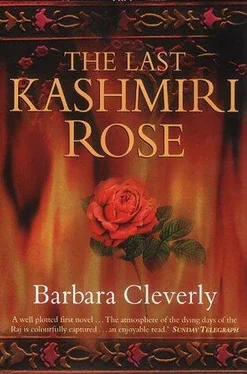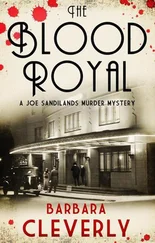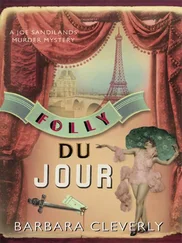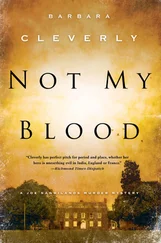It was a fetid little enclosure and with his spare hand he pushed open the window through which instantly there came a murmur of unfamiliar sound. An unfamiliar sound in a crescendo and – there – what was that? A shot. And another shot. Buttoning himself up, he stood on tiptoe and gazed out of the window. There was a yellow leaping flame beginning to spring from one of the bungalows, about half a mile away, he judged. A fire? Yes, there was a fire and now there was a smell of smoke. A fire in the lines? Probably nothing. No one else seemed aware of it as he hurried back to the dining-room.
‘There’s a fire!’ he said. And then again, “There’s a fire in the lines!‘
In line abreast, the five Greys officers cantered on down towards the disturbance. They clattered into the compound and surveyed with dismay the ruin of Prentice’s house. And here they were challenged by a figure in a scarlet mess jacket, his white shirt front blackened. The Braganza Lamb in silver thread on his lapel identified the Queen’s duty officer. Four British soldiers, presumably the Queen’s fire picket, were hauling on the handle of the fire engine and two more were directing a jet of water into the ruin. Others, faces bound in cloth, made useless attempts to approach. Riflemen stood by.
‘What the hell’s been going on here?’ said Major Harry.
‘Disaster! Total disaster!’ came the reply. ‘We did our best but we were too late. Bloody fire engine! About as much good as a water pistol! We organised a bucket chain but we were too few and too late.’
‘Too late to save the bungalow?’
‘To hell with the bungalow! Too late to save Dolly and Midge Prentice.’
‘But they’re in Calcutta with Giles! He always takes them with him!’
‘Not this time, he didn’t! It’s Midge’s birthday tomorrow – Dolly stayed at home with her for her party. Good God! My girls were going!’ He wiped a blackened and bleeding hand across his face. ‘My girls were to be there,’ he said again. ‘No, there’s no sign of Midge or her mother… must be still in there… what’s left of the poor devils… The minute this lot cools down enough to get men in we’ll look for the bodies. Jesus! And Prentice away! I say – a disaster!’
‘But who the hell…?’
‘Dacoits… we think it was dacoits. Doped up, no doubt – drugged-up courage. In a mood to stop at nothing. It happens. Prentice had been routing them out of village after village and they came for him. Didn’t know he was away, I suppose… Or perhaps they knew only too well! They’ve chased all the servants off or they’ve fled. No sign of them anyway. Come crawling back in the morning I dare say and then we’ll find out more.’
Dickie Templar had heard enough. He turned aside and blundered into the darkness to hide his distress. He stopped dead. He had heard a faint cry.
From a stack of tall flowerpots there emerged a ghostlike figure: Midge Prentice, white face a mask of terror, her bunched nightie gripped convulsively in a small hot hand. Dickie fell on his knees and gathered her in his arms, sobbing, kissing her face and holding her to him, murmuring childish endearments. ‘You got out!’ he said at last. ‘You got out!’ And then, ‘Where’s Mummy?’
For reply, the child pointed dumbly to the smouldering ruin of the house.
CALCUTTA 1922
Commander Joseph Sandilands of the Metropolitan Police was delighted to be going home. Delighted that his six months’ secondment from the Met to the Bengal Police should, at last, be at an end.
He’d had enough India. He’d had enough heat. He’d had enough smells.
Though no stranger to the midden that was the East End of London he’d not, by a long way, been able to accept the poverty that surrounded him. And he still resented the social formalities of Calcutta. As a London policeman, his social status had been, at the least, equivocal in the precedent-conscious atmosphere of the capital of Bengal. He had counted the days until he could pack, say his farewells and go, but even that pleasure was denied him; inevitably, the bearer who had been assigned to him had done his packing for him. But, by whatever means, it was at last done and tomorrow he’d be gone.
For the last time – he sincerely hoped it was the last time – he made his way into the office that had been allocated to him. For the last time he cursed the electric fan that didn’t work. For the last time he was embarrassed by the patient presence of the punkha-wallah manipulating the sweeping fan that disturbed but did not disperse the heavy air. There was, however, a neat envelope lying on his desk. Stamped across the flap were the words: ‘The Office Of The Governor’.
With anxious hand he tore open the envelope and read:
Dear Sandilands,
I hope you can make it convenient to call in and see me this morning. Something has cropped up which we should discuss. I have sent a rickshaw.
Yours sincerely,
And an indecipherable signature followed with the words ‘Sir George Jardine, Acting Governor of Bengal’.
Joe didn’t like the sound of this. Could he pretend he’d never received it and just leave? No, they’d catch him in the act and what could be more embarrassing than being brought back from the docks under police escort? Better not chance it! He looked angrily out of the window and there were, indeed, two liveried rickshaw men waiting to deliver him to the Governor. He’d met George Jardine on one or two formal occasions during his secondment and formed a good impression of the distinguished old pro-consul who had come out of retirement to bridge the gap between two incumbents.
The appointment seemed to be a formal one and he paused in the vestibule to check his appearance. ‘God! You look tired, Sandilands,’ he muttered at his reflection. He still half expected to see the eager youth who had set off for the war with the Scots Fusiliers but, though the hair was still black and plentiful, after four years in France and four years with the police his expression was watchful now and cynical. An old wound on his forehead – badly stitched – had pulled up the corner of one eyebrow so that, even in repose, his face looked perpetually enquiring. Six months of Indian sun appeared to have bleached his grey eyes as it had darkened his skin. But at least in India everything he possessed was polished without any word from him. He adjusted his black Sam Browne belt shining like glass, his silver rank badges and his medal ribbons, the blue of the police medal almost edged out by the red and blue DSO and his three war medals. He’d do.
The rickshaw set off without a word, the rickshaw men trotting steadily ahead through the heavy press of traffic. Seeing the Governor’s livery, people made way for him. ‘Another six months,’ he thought, ‘and I believe I could get used to this. It’s certainly time I was home!’
‘Morning, Sandilands,’ said the Governor, as though greeting an old friend. ‘Not too early for a peg, I hope? Whisky-soda?’
‘Yes,’ thought Joe, ‘far too early but what can one do?’
He watched as Jardine poured out two generous glasses.
‘I have your chit, sir,’ he said, hoping he didn’t sound as resentful as he felt.
‘Yes, well…’ the Governor began. ‘Funny business. I’ve wired your chaps in London, and hope you don’t mind my having done so, over your head, as you might say. But – your lecture the other night – I was very impressed… Everybody was. Opened our eyes to a lot of things! Don’t want to cut down our chaps here – they do a wonderful job – but they’re up to their ears and it has come to me that maybe we need a little bit extra. May be nothing in it, of course. Once the women start gossiping you never know quite where it’s going to end and…’ He paused and sipped his drink. ‘Do help yourself. But the fact is that I telegraphed your chief to ask if we could borrow you for a bit longer. Everyone here would be delighted – but the problem isn’t here, it’s in a place called Panikhat about fifty miles south of here. It’s on the railway. Not a bad journey and they’ll put you up in splendour and state, no doubt. Pretty good fellows down there. It’s a civil and military station.’
Читать дальше












